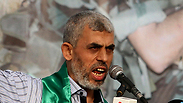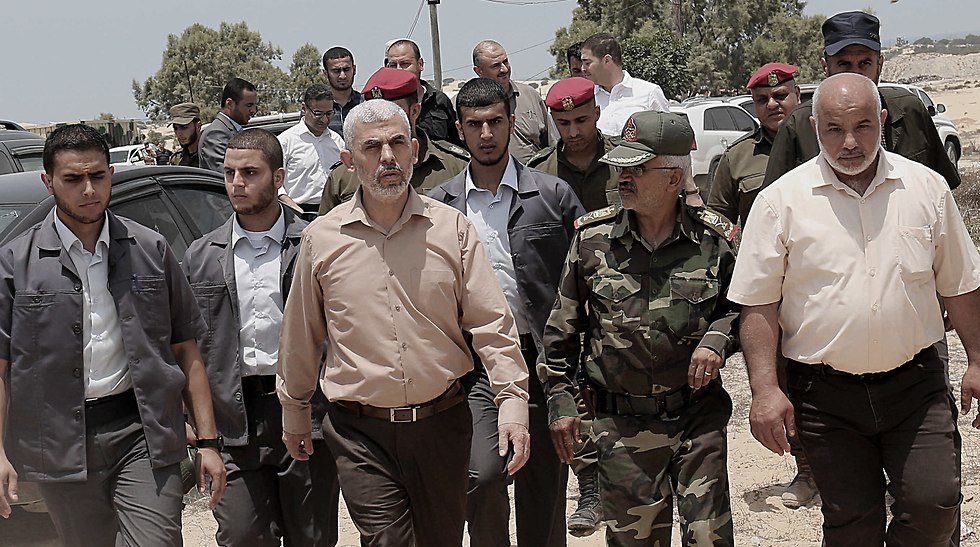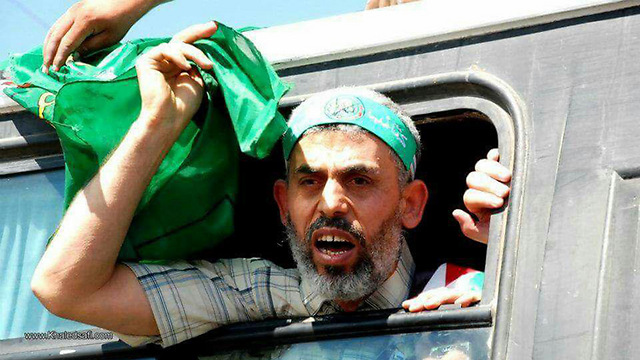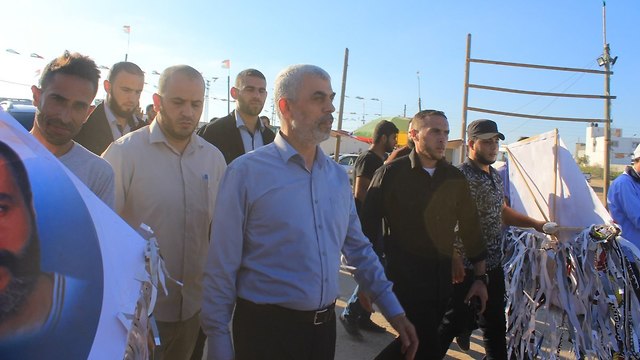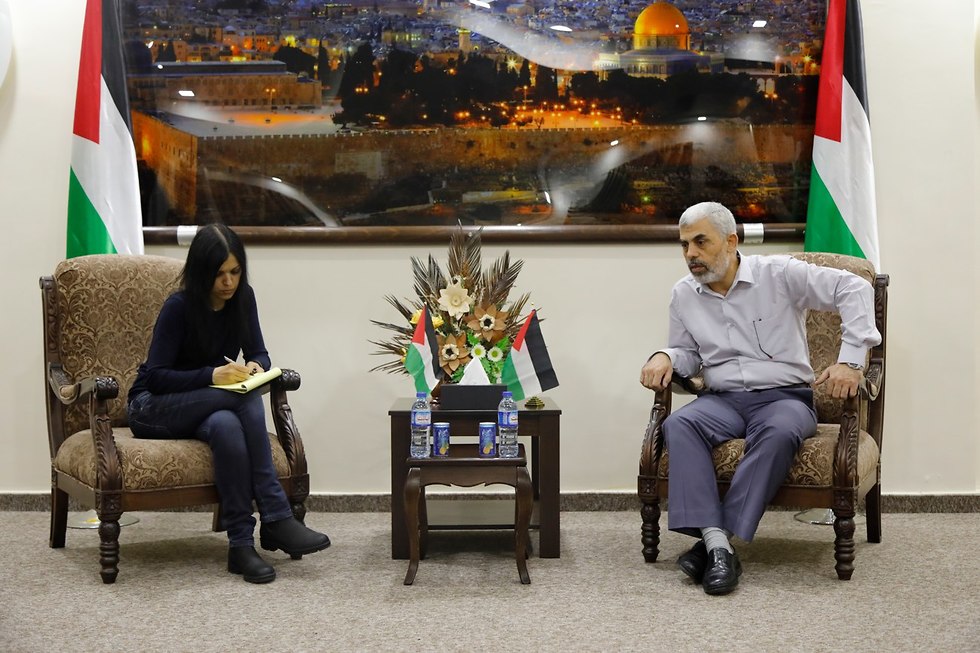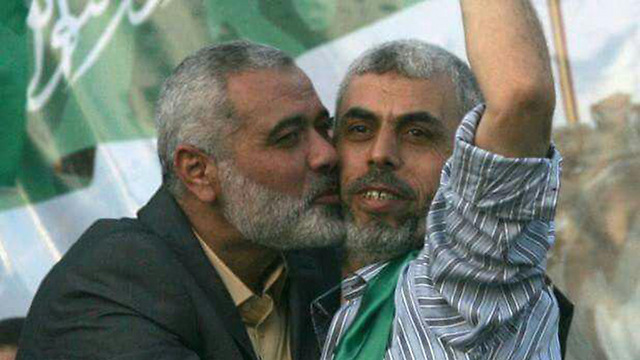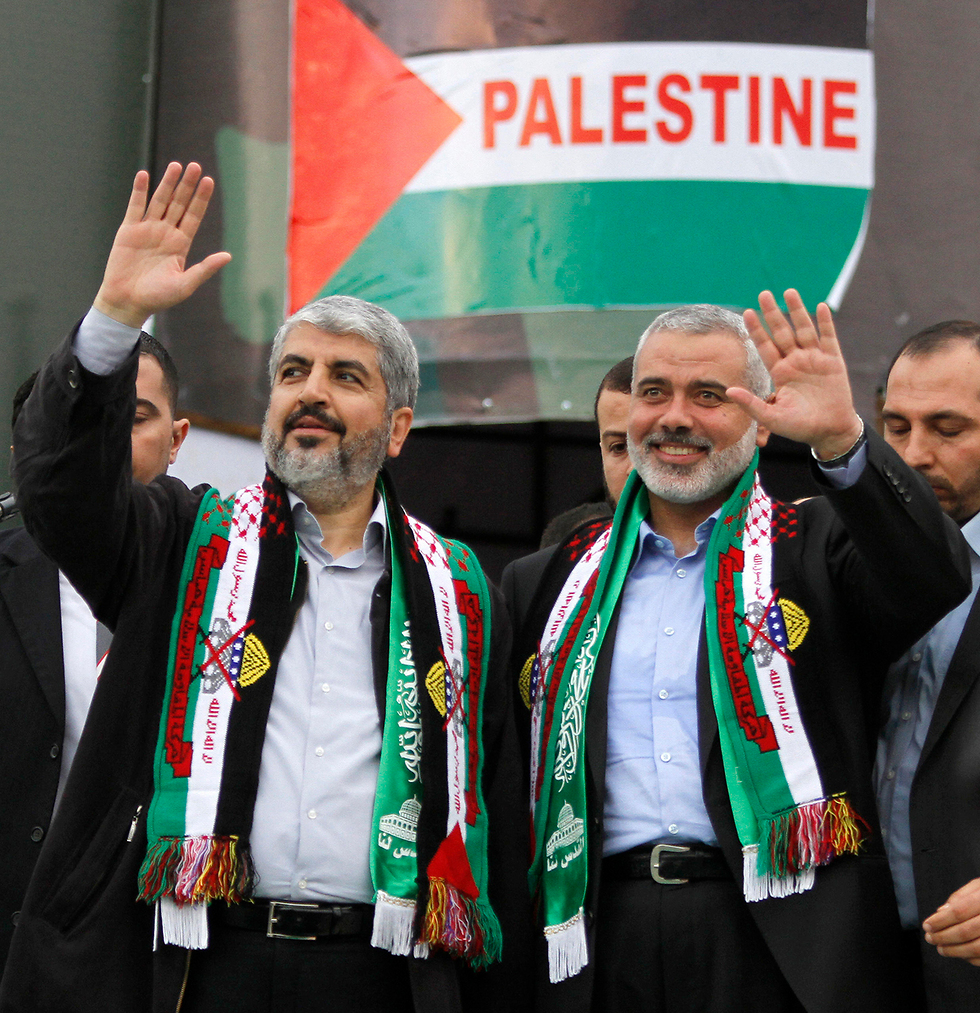
Sinwar's hidden message: Calm for Gaza rehabilitation or war
Analysis: The interview with Hamas leader in Gaza is a call for help, a moment before winter makes life in the strip hell and puts his rule at risk. And between the lines there's also a warning: this is the last chance for a change. If the stalemate in talks continues, Sinwar indicates he won't hesitate to go to war.
In the interview, Sinwar presents his own alternative to war. He is worried by the destruction another round of fighting could leave in the strip. Such a military campaign, Sinwar knows well, is the physical eradication of Hamas's military wing, which will also include serious harm to the civilian population and damage to infrastructure.
In his eyes, the Israelis view him as a bloodthirsty psychopath, a manipulator whose way is the way of terrorism and his ambition is the extermination of Israel. The two years that have passed since he gained power did not change this image. Now he's trying to send a message that the average Israeli has yet to hear directly from him, and that might be accepted by some Israelis as something that makes sense. Perhaps that way there could be public pressure on the Israeli government to talk to him.
Israeli officials, meanwhile, claim that while he is trying to reach an arrangement that would lead to calm—he wants it on his own terms; a direct agreement with Israel—via the UN, the US and Egypt—which bypasses the Palestinian Authority. Such an arrangement could serve both to boost Sinwar's status and to strengthen the Hamas organization ahead of the expected power struggle in the Palestinian arena in the post-Abbas era.
A prisoner's mentality
Sinwar was and remains, mentally, a life prisoner. In the interview he describes his life in Gaza as a direct continuation of the almost 23 years he spent in Israeli prison. The same conspiratory nature, the same compartmentalization, the same survival tactics facing the Israeli jailer continue flowing through his blood.His relationship with those who surround them is also not different in essence to the one he had when he led the Hamas prisoners in Israeli prison. People around him were afraid of him. Before he entered prison, he established and commanded over Hamas's internal security mechanism (al-Majd), which was entrusted with exposing traitors and eliminating them.
He was considered a strong man: he was the one determining strategy that others would then carry out. This is what allowed him then, in prison, and today, in the strip, to run a very pragmatic policy. Had there been a weak leader in Gaza, an all-out war would've erupted long ago—as this is the popular solution a weak leader would've erred in choosing.
Sinwar, even in prison, never went straight for the extreme solution. He preferred launching "soft" protest measures: prisoners closing themselves up in their cells, not spending time out in the prison yard, disrupting the order—but don't throw out the rule book. Only in the end, when all of these measures failed to help, he would decide to launch a hunger strike or attack prison guards—extreme measures the prisoners paid dearly for, but at least this got their voices heard.
The leader of the prisoners, who became the leader of two million citizens in the Gaza Strip, has not changed his spots. To him, reaching an arrangement is the preferred step to break the stalemate. If that doesn't work, the second stage is popular protests on the border: first once a week, later at night as well—until it becomes a daily occurrence. With time, the violence at the protests escalates further and further: from stones and tires to incendiary kites and balloons, and from there to explosive balloons. To him, burning fields and fences is still a popular protest move.
The next stage would include makeshift explosives thrown at soldiers and attempts to breach the border fence. If all of that doesn't work, a drastic move will follow, which could rock the region and bring to the change Sinwar mentions in the interview. As far as Hamas is concerned, this doesn't necessarily mean firing rockets and closing down Ben-Gurion Airport. It could also be an infiltration to Israel by breaching the fence or through a tunnel and the abduction of civilians or soldiers—and not a handful, but a big group. Sinwar knows Gaza would pay dearly for this, as the prisoners sent to attack the guards paid. He knows the IDF will go mad. But after the anger, Israel will start having serious talks with him about an arrangement and prisoner release.
The interview with Sinwar is being published before this stage of throwing out the rule book. Hamas and the other factions in the strip are currently busy thinking and making decisions ahead of the move to the third stage. This is probably what Sinwar means when he says this interview is a historic opportunity to make change and reach stability and security. He doesn't want to miss this opportunity and hides a threat between the lines: If you don't accept my proposal, you'll suffer greatly.
Sinwar doesn't set a deadline to commit him to escalating the situation if Israel doesn't accept his proposal. But during an internal briefing to journalists in Gaza in late July, he said: "Hamas will not accept the continuation of the existing situation in the strip and will do everything to change it—either by negotiations or with a conflict. The citizens of Gaza should feel that change by mid-October." Here he actually does point to a deadline: if there's no change, we'll be at war by mid-October.
And when Sinwar describes this war to the journalists, he brags: "We can fire in five minutes the same amount of rockets we fired during the 50 days of the last war." He also warned then that if Israel tries to attack Hamas's rockets apparatus, the rocket-alert sirens won't stop going off in the greater Tel Aviv area for six months. In this interview, he foregoes threats of this type and tries to turn to Israelis' conscience.
The 'traitor' from the Mukataa
Defense Minister Avigdor Lieberman recently said in an interview with Yedioth Ahronoth that based on the information on his desk, if elections were held in Gaza today, Hamas would lose. If that is accurate, Hamas doesn't need Lieberman's opinion to see the severity of its political situation. The Hamas movement, which marked 30 years to its establishment last year, is currently at the lowest point in its existence. Despite the fact it is being led by a Gaza-born man, who is charismatic, popular, with an impressive and impeccable record of fighting Israel, the strip reached its lowest point in quality of life and standard of living. This is a true catastrophe. And if that's not enough, Hamas has gotten no achievements to show for in the field of the "Muqawama"—the armed resistance.
Sinwar and his gang know well that all of the problems—the personal, the social and the economic—will get even worse come winter. No gas, no electricity, houses are burning down from fires lit for heating and cooking, diseases spreading, people freezing to death. Both in the interview and in the internal discourse in Gaza, Sinwar and Hamas are not taking any responsibility for the situation. Everyone's to blame: Israel, the Europeans, the PA. Everyone, except Hamas. However, it's clear to Hamas that without an improvement in the quality of life in Gaza, the public will grow tired of it. When Sinwar is talking about a historic opportunity to reach an arrangement, to him it's a historic opportunity to survive in power. Holding onto power is the supreme goal, which justifies, to Hamas, a sort of pragmatism when it comes to dealing with Israel.
The last time Yahya Sinwar gave an interview to an Israeli media outlet was in 2006, long before he became the leader of Hamas, when he was still a prisoner in Israeli prison. When it comes to Hamas's long-term strategy, he hasn't changed his position one bit. Back in 2006 he explained that as a Muslim, he cannot accept Jews living on the Islamic holy land—but Israel is an established fact.
Sinwar's pragmatic side tells him: in the current conditions, I cannot annihilate Israel. If in 2006 he was talking about how Israel has 200 nuclear bombs, today he's talking in terms of slingshots facing an air force. This is why, in the current stage—which is not limited in time—he offers a temporary truce, a hudna. Not quiet for quiet, as the Israeli government proposes, but quiet from him in return for the improvement of the standard of living in Gaza. And not just a humanitarian improvement, but a wide-scale move that includes mass investment in infrastructure that would lead to prosperity in the strip. A kind of hope for the residents of Gaza.
This isn't just the cynical views of a politician seeking to remain in office. Sinwar's motto as Hamas's leader is: Gaza First. And when he's talking about the distress of the youth in Gaza, it's real. That is why, in his softened rhetoric, he's willing to accept Israel as an established fact for an undetermined period of time. As far as he's concerned, the solution can come in the next generation. Until then he is not willing to give up the organization's military buildup and its arms—because he knows no one would even look his way if he didn't have weapons to make threats with. He doesn't say when, if at all, he would agree to discuss the strategic aspects with Israel, and whether Hamas would draw its arms the moment a permanent solution is on the table that is not acceptable to the movement. The mission now is to save Gaza, nothing else matters.
By the way, in the Hamas parliament meeting that was held the day Abbas spoke at the UN, Ismail Haniyeh and Khaled Mashal were talking about the "traitor" who signed the Oslo Accords. They didn't mention him by name, but they meant Yasser Arafat. While they were at it, they declared Abbas's rule illegitimate, as his term ended in 2009, and since then he's had no authority to represent the Palestinian people. Meaning, they reject both the accords and the Palestinian leadership.
Now Sinwar comes and tells the Israeli public: Give me a few good years to reorganize, rebuild Gaza, allow it to prosper—and I'll give you quiet during that time. I'm not going to sign any peace agreements with you, and I'll make sure no Palestinian does so either. We will have a relationship of convenience, until one day I'll kick you out. Unless by the next generation we get used to one another, and then we might find another solution for you.
Sinwar is creating the feeling that this temporary situation can last for many years, without Israel having to recognize Hamas and without Hamas having to recognize Israel. This, by the way, was already proposed by Hamas founder Ahmed Yassin 21 years ago, and Israel wouldn't accept it as it was not willing to live next to a ticking time bomb that would one day decide to go off. Furthermore, Hamas would be an obstacle to any possible arrangement with the Palestinians in the future.
The Iranian connection
The Israeli defense establishment sees things differently. While Sinwar is talking about calm in return for changing the standard of living in Gaza, the relationship between Hamas and Iran is gaining momentum; there is sharing of knowledge and transfer of funds from Iran to Gaza at an unprecedented scope. The influence of Hamas's representative in Lebanon, Saleh al-Arouri, on the Hamas-Iran-Hezbollah ties and Hamas's terror activity in the West Bank is significant. Israel is very worried by the Iranian involvement in the strip, which fuels the fire along the border and bolsters the extremist positions against Israel.
Furthermore, at the moment there seems to be no change in the massive investment Hamas makes in building up its military force. There are no signs of investment in the civil sector at the expense of the military buildup. Israel would've liked to see some sign of goodwill, beyond rhetoric, but Hamas is not providing this sign.
Sinwar also wouldn't budge on the issue of Israel's MIA and POWs held in Gaza. To him, this issue is an inseparable part of negotiations to release Palestinian prisoners, mostly those arrested before the second intifada, who Israel allegedly committed to release as part of the Shalit deal in 2011.
The first sentence he said when he got off the bus in October 2011, upon his release from prison as part of the Shalit deal, was: "We left our brothers behind, and we won't forget Hassan Salameh and Mahmoud Issa" (who were arrested before the second intifada). Sinwar sees Hassan Salameh's mother, who lives next door to him, every morning when he leaves the house. She makes sure he won't forget her son, whom he left behind, for even a moment.













